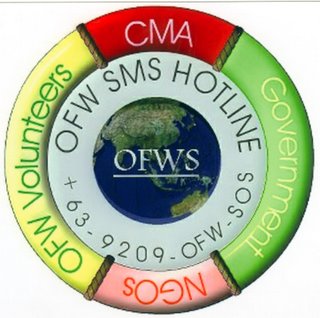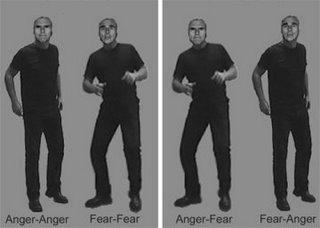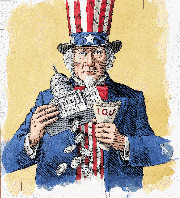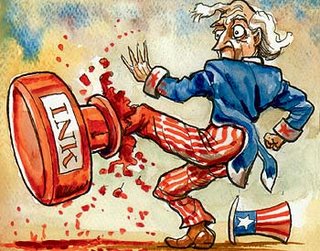
Rediscovered my following essays originally posted to an email list group way back in late 2003. But on rereading are just as apropos now as then, especially with the recent selection of
Dr. Mohammad Yunus, the father of micro-finance, as the 2006 Nobel Peace Prize winner.
Applying Applied Economics to Overseas Filipinos CasePlease allow me to put a different spin to all the inspiring inputs that you and the others have detailed in your and their posts.
But before anything else, having originally come from Mindanao, I would suggest that ascribing Filipino traits on a regional basis, in reality might be more conventional lore than fact. Thus, I believe it would serve well for all of us to point to them as simply Filipino traits, rather than qualities attributable to a particular regional area and its inhabitants.
With the foregoing set aside, I am of the mind that the individual overseas Filipino's ideal relationship to the old homeland, solely on the tangible level, can be plotted out using our standard double-entry accounting system. And in the process one can apply the practices of Applied Economics to bring relevant economic theories into actual practice.
For this particular purpose, the purely OFW Filipino may not be properly included since his/her intent is simply to earn abroad and spend locally. In the final analysis for them, no Philippine resources are permanently removed from the old homeland, since the "local investments" on each OFW are compensated with "earnings" returns.
But as you most eloquently advanced, most overseas Filipinos, most especially those who opted to permanently reside abroad, got to their present status initially or even subsequently using Philippine resources. Resources needed to file, apply, and get approval for their migration papers; transport/plane fare and related expenditures; financial resources needed for the initial months of job hunting, adjusting to new living conditions, etc; even skills and educational capabilities acquired in the old homeland, using local educational services, etc.; and more etc.
In fine, each affected overseas Filipino begins his new life in his new environs, owing a debt, a considerable debt to the old homeland. A debt, nonetheless, since it is reflected as a diminution to the overall value of the local economy. And for that reason, the country is rendered that much poorer and that much unable to provide for its own needs. In simple terms, the Philippines is poor because collectively it has very limited purchasing power. And this dearth of purchasing power is magnified and exacerbated by the millions of Filipinos who have participated in the ongoing exodus.
Fortunately, most of the debt can be quantified to a degree, even the skills and educational capabilities acquired and brought to bear in the new homeland to earn a living and participate in that country's prosperity. Is it not incumbent then for each concerned Filipino to make that accounting and to earnestly attempt to balance the books, if only for the sake of fairness and fair play? Love of country does not even have to be factored in. It's simply payment of debt, pure and simple.
To gauge the level of awareness to a similar issue, I once asked a group, directed specifically to those who opted to retain Filipino citizenship and thus, were still Filipino nationals and thus subject to all the Philippine laws pertinent to them, if they were still paying Philippine income taxes that were STILL REQUIRED THEN for every year of stay abroad. Only one took the challenge and answered in the affirmative. Admittedly, it was a hard and bitter pill to swallow. (Update: OFWs are now exempt from paying Philippine income taxes while earning abroad.)
In applying Applied Economics, the matter of sending consumer goods in
balikbayan boxes to the old homeland may also be considered a rather counterproductive move economically. For every can of
Spam sent, there is one less local luncheon meat product that may not be sold and consequently not produced, resulting in reduction of local capital inputs and labor requirements for such an item. Resulting further in lesser potential taxes to be collected. Needless to state, this is multiplied in the hundreds of millions of countless consumer items sent over all these years. An instance where the
balikbayan box may be made tenable economically is when instead of consumer goods, capital goods are put into it, and thus will be used to produce more value and aid local productivity.
Why the dollar remittance should still be the preferred choice of contributionAside from being the most used and most acceptable currency in international commerce, the dollar is also most helpful to the Philippine economy. It not only keeps its international reserves in dollars, it also earns more through the process of foreign exchange conversion transactions. And if dollar remittances are channeled into the local banking system, as they should all be since it is required by law instead of through other "alternative" or black-market outlets, then the banking industry is that much more funded to lend money hopefully for more capital and productive projects. More dollars into the country also mean that the country is that much more financially able in importing hopefully again more capital goods for more production, rather than for more consumption.
These are a few of my personal but general and random thoughts on the matter of overseas Filipinos.
*********************************0000000000000****************************

It is very encouraging to get a positive response from this kind of talk, which as Ernie intimated is not as dramatic or eye-popping as the continuing saga of giggly (blank) and her well-rounded antics, and if I may add, not as consuming as all the political rumblings that have now taken hold of the entire country's consciousness. And even more so, because it originates from somebody who continues to cultivate his stakes in the old homeland, which in my agnostic view, is the more heroic stance rather than the more popular perception that leaving the country is, regardless of the motives or the urgencies. Pardon this little bit of heresy.
Lest we forget, what I say here, or most anybody else for that matter, cannot be anything new or earth-shaking, since most of these ideas should now be part of conventional wisdom and thus within reach of any thinking and well-meaning individual. Like prayers, what may be needed is to keep repeating and harping on them until action ensues.
In my own little ways, I do try to put into action as much as I am able to the ideas I enunciate here and thus, I do feel a certain comfort in bringing them out into the open. Thus, to pursue this line of discussion, here are more ideas and paths of action that are humbly recommended for the benefit of both homebound Filipinos and those overseas.
Arguably, every overseas Filipino must be feeling sorry for our beleaguered country; but I say, especially for those of us who have not undertaken any accounting and balancing of the book on homeland balance sheet, to feel instead a tinge of remorse. Feelings of sorrow could usually lead to bouts of depression and emptiness, or the like, but remorse normally leads to "restitution" to get into the path of resolution. Admittedly, many may feel a sense of helplessness toward really being able to assist. But this is not so, as we individually do have the means to be counted as able. And we will not necessarily be talking here about altruism, patriotism, charity, and other ennobling emotions, but strictly on the order of good and smart economic sense.
I for one am of the firm, though minority, belief that in the order of priorities set toward improving conditions in the country, Economics should take more precedence than Politics. Good governance cannot be expected to stand tall and stable under faltering economic conditions that have left many of the citizens, those who have not left the country, both hungry and angry, and of course, ignorant. Recent reliable stats peg the country's extreme poverty levels at 40-50%, with areas in Mindanao, especially in ARMM, registering 65% or more. It definitely could be worse now.
There is a common truism in macroeconomics that may be termed the rising tide theory and which is apt to our discussion. Simply stated it premises that while a rising tide will raise everything within its wake, the same may be said about raising the economic conditions of a place. A rising economic prosperity brings better education, more informed citizenry, better future expectations, and collaterally and inevitably, better governance.
What to do? The Philippine Foreign Currency Deposit system has been in effect since the 1970's, though promulgating regulations may have changed over time. It is a known fact that dollar deposits are part of the deposit services of most CB-authorized unibanks, which are the commercial banks. Can euro-denominated accounts be opened, too? This I do not know but given the suddenly surging value of the euro against the dollar, one is inclined to believe it may soon be available, if not already. The ratio now hovers around 1:1.2 in favor of the euro.
What may not be common knowledge at this current time is that dollar deposits in the Philippines earn considerably more than, say, the US. A number of reasons may be attributable to his disparity but suffice it to say that such is the case at present.
Can the banking system in the Philippines be trusted? I can speak only for the two biggest private commercial banks since I worked with them for a time; and one was established in the 1800s. But the banking system should be one of the last bastions of stability and reliability in any country. Absent this and that country would be anathema, both locally and abroad.
These accounts can of course be opened while in the Philippines, but given the well-scattered branching of Philippine banks where overseas Filipinos congregate, it should not be a big stretch to assume that if there is a demand, these foreign subsidiaries of Philippine banks will only be too glad to open such accounts for such overseas clients.
No spare money to deposit? Filipino community leaders abroad have always been unanimous in their praises for that model minority immigrant Filipino household that has out-earned most minority immigrant groups, and in some places, even outdistancing the majority group's gross take-home. That is the earnings side of the issue, now its time to upgrade the savings side of it. Americans are notorious for having an embarrassingly low propensity to save, and I suppose that necessarily includes the minority groups. This is where that spare money could originate.
The paycheck-to-paycheck reality, which admittedly is experienced by many, in my estimation, is borne more out of insufficient knowledge or tepid determination rather than due to compelling necessities. A lot of unnecessary expenses can be pared down, and for this the typical Filipino family, whether at home or abroad, is most adept and adaptable, or at least is malleable enough to be taught so or even forced to by circumstance.
A while back and here in the San Francisco area where the cost of living is arguably highest in the entire USA, I once tracked my actual living expenses, groceries and all, against periodic welfare payments made to recipients. I was quite amazed to realize how closely my family could have survived on those welfare payments. Just closely though, but not quite. Still, a surprisingly sobering revelation.
What are the advantages? The expected advantages are legion. Here are some. Right off the bat after such an account is opened, more investible capital is injected into the economic mainstream, restricted only by the reserve requirements due this type of deposit liability. In other words, banks have a good portion of this deposit available for lending out to hopefully, productive endeavors.
Should the depositor instead desire to lend the money himself to a trusted relative, a partner, or whatever, to capitalize a business, the bank service of deposit hold-outs can be resorted to where a good portion of the deposit can be used to collateralize the loan, optionally including the partner/relative as co-maker. The dollar deposit remains untouched while the loan is released as a peso credit for both servicing and repayment. From experience, loans of this nature are normally much cheaper to secure and service compared to other types of loan.
What if the overseas Filipino needs funds from the account? Just as the modes of inward foreign remittances to the country are quite easy, known and expeditious, so would the outward foreign remittances be. Again, once the demand is there, you can bet those foreign subsidiaries of local banks would be most willing to service them for a fee.
It is a sad commentary to point out that in the hinterlands of Mindanao and other blighted areas of the Archipelago, the local banking system which is supposed to fuel the engines of economic development, while continuing to maintain their presence there, have in droves retreated their local investments away from those areas into more urbanized areas where the expectations of profit are better. It has deteriorated to a point where they are not even able to plough back to their local economies, the same exact amounts of deposits that they rake him from those areas. At the very least, this is a huge slap against their avowed mission of pooling local deposits for investment locally. As illustrated above, this retreating trend needs not be irreversible since this new breed of depositors could determine to a degree where and how their deposits will be invested.
Amidst all these, results of studies upon studies about the poor and its predilections remain unheeded. By and large, THE POOR DO NOT NEED DOLE-OUTS. What they need is access to capital. The poor is not averse to paying back just debts/loans, they just need to be guided and taught how. Experts on micro-finance worldwide will only be too glad to furnish proof for these pronouncements.
So there you have it, on the rather long side. And we did not even touch on donations, contributions, or other normally commendable philanthropic devices that appear to be the path of choice nowadays. What we have envisioned is a gifting, that is not really a gift but an investment with expectations of reasonable returns, and which will keep on giving.
 Just learned today that our local community paper, Tracy Press, has on its website initiated a listing of community blogs in the City of Tracy. And this humble blog (including my spin-off blog, Hobbies and Pastimes) were included on the list, clearly because I include Tracy as my location in my Blogger’s profile.
Just learned today that our local community paper, Tracy Press, has on its website initiated a listing of community blogs in the City of Tracy. And this humble blog (including my spin-off blog, Hobbies and Pastimes) were included on the list, clearly because I include Tracy as my location in my Blogger’s profile.









